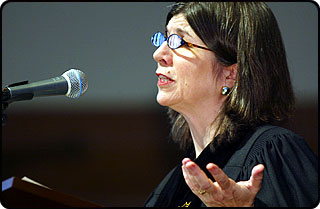Journalist Quindlen lauds role of media in fostering dialogue
 In a passionate speech that unfolded as a broad defense of the modern media, Pulitzer Prize-winning journalist and best-selling author Anna Quindlen told an audience at Wake Forest University Feb. 19 that the variety of news sources and more diversity in news organizations has given the American public a deeper understanding of the world.
In a passionate speech that unfolded as a broad defense of the modern media, Pulitzer Prize-winning journalist and best-selling author Anna Quindlen told an audience at Wake Forest University Feb. 19 that the variety of news sources and more diversity in news organizations has given the American public a deeper understanding of the world.
“The media when I was a kid was largely by white men for white men,” Quindlen said. “I believe that now there is more information about more kinds of stories than ever before. Our kids have learned from the media something that I never learned as a child, how the world really works.”
Quindlen’s speech was part of the university’s Founders’ Day Convocation. It will be broadcast in its entirety at 8 p.m. Feb. 19 on radio station WFDD (88.5 FM), the public radio station at Wake Forest.
Several university awards were presented during the ceremony, including the university’s highest honor, the Medallion of Merit. Edwin G. Wilson, provost emeritus at the university and a long-time English professor and administrator, received the award.
In her speech, Quindlen, a journalist and author who has published work in some of America’s most influential newspapers and most widely read magazines during the past 25 years, compared the media of her Cold War youth with the modern media.
“When I was a child there were three television networks,” she said. “There was one news program at 7 p.m. and that was it. If you missed it, you missed it. I grew up with the notion of the then Soviet Union as the evil empire. The media has proven its ability to demystify other countries.”
In addition to her advocacy of the modern media, Quindlen, who writes the prestigious “Last Word” column in Newsweek magazine, offered a warning to those who would admonish reporters and media outlets for offering stories that seem irrelevant or sensational because the types of stories that are produced are often the result of an effort to meet the demand of consumers.
“The consumer has the power over the media,” Quindlen said. “Civil discourse in America will inevitably largely be shaped by the media. And, what is in the media will be shaped by you.”
Quindlen’s speech was offered as part of the university’s ongoing celebration for the 2003-2004 theme “Fostering Dialogue: Civil Discourse in an Academic Community.” The theme is dedicated to the exploration of how free people with passionate interests and beliefs can communicate openly without turning dialogue into discord.
Quindlen said that it is the ability of the media to offer those things that define us – discourse, argument and disagreement – that make it a viable and important part of our lives.
“The media has become the national back fence now that so many of those fences are gone,” she said. “Media is the ultimate democratic act. It can offer understanding for all of all. Media offers us a common language. It has the unique power to educate and unite.”



